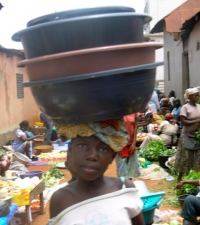10 Tips for Living in a Developing Country

We moved from a pretty idyllic, ‘normal’ life in Australia to Ghana, West Africa. Crazy? Perhaps. But it has been a pretty extraordinary adventure. For the first year we lived on a mine site in rural Ghana. Now we split our time between the mine and Kumasi, the second city of Ghana. We’ve experienced a culture very different to our own, seen lives and expectations and circumstances that you could never experience from a book or documentary.
While living in a developing country can be a very rewarding experience, it can also be exhausting, stressful and just plain tedious. Whether you are thinking about making the leap, or have already done so, here are some things to consider.
-
It’s your decision and no one else’s
So make sure it’s an informed one and it’s the right one for you and your family. If you don’t know the country, read up on it. Or if you are very fortunate, try and visit before you make the final decision. While nothing can truly prepare you, it helps to have as much information as possible. While I wouldn’t move my three kids to Afghanistan, Ghana is a stable, relatively safe, English speaking country. But it’s not for everyone; I had a woman at home tell me “She loved her kids too much to take them to Africa”. I politely reminded her that there were plenty of children in Africa; but clearly this move isn’t for her.
And after you arrive, there are hundreds of decisions to make. Ensure that they are yours (and your partners), remain positive and remember, things in a developing country will rarely magically right themselves. It’s up to you to fix it.
-
Be Prepared for Culture Shock
It is very real. After the initial exotic honeymoon, be prepared for the crash. If your circumstances are particularly challenging, as ours were, be prepared for the ups and downs to last a long time. There are days when everything seems difficult, when you can’t read body language or make yourself understood, when a seemingly easy task takes on gargantuan proportions - then it’s time to take a step back. Go easy on yourself and realise…
-
It’s OK to live in a Bubble
Life in a developing country is often hot, chaotic and overcrowded. Combine that with a different sense of personal space and soon enough you need a break. While it’s tempting to start your new life with a clean plate, it’s really important to make your new home feel like, well … home, particularly if you have children. It makes the settling in process much easier for everyone. Our first house in Ghana was furnished so we brought books, paintings, coffee machines and enough toys and craft supplies to (almost) sink the ship. Bring, or get a pet when you get there. Despite being fervent dog people, our little white Ghanaian cat has given us so much joy and made it feel much more like home.
Also consider those things we take for granted in the developed world, will you have access to a generator, reliable water supply, air-conditioning, craft supplies? And remember, no matter how much you plan they will not always be there.
-
Make sure you break the Bubble
So you are settled in, and it can seem very easy to stay in that safe little bubble you’ve created. But that’s not why you are here! Get out there, meet people, see the local sights (after all, it is unlikely that you will visit this country as a tourist). There is never a shortage of things to look at; I love just watching people carry out their lives, amidst all the colour and chaos. The bubble will be there when you get back.
-
Guilt is a Wasted Emotion
It can range from seeing people whose lives are much less fortunate than yours on a very close scale; to the lashings of mother (or father!) guilt you feel when your children have a bad day. Remember Point 1, It’s your decision, so you decide how to react. By far, our biggest stress involved schooling and so we made a series of decisions and tried very hard to keep the big picture in place.
-
Routine
Yeah, I know you’re off on this big adventure, breaking out of old routines and habits; but routine is important. This is particularly so if you are the trailing spouse. I swallowed my pride the day I read my residents visa in which it was clearly written “spouse” as occupation. So, while we might come across a pack of gin swilling, over-privileged tennis players; it is actually our job (not to swill the gin, that’s just a perk) to get kids settled, to find friends and keep the show on the road. Routine helps here, and keeps the padded cell at bay.
-
Co-dependence
This is actually a huge positive. With new friends, and particularly as a family, you get very close. Our kids rarely fight, because they know they’ve got to get along (or so I keep telling them). When there is no family around, friends can become very important. Particularly in a developing country you will be friends with other expats. While we have some Ghanaian friends, outside of my husband’s work they are exclusively married to expatriates. With few expats in our city, we joke that we are friends because we have to be, not because we want to be; but there is a strong community and even a sense of facing adversity together.
-
Make like a Scout and be Prepared
No one wants to be looking for a reliable doctor when malaria appears at 2am. Outside the capital few businesses are online, and developing countries work on word of mouth, it’s a case of knowing who to ask. Your company may have a local contact, or rely on experienced expats for advice. The have seen and done it all and their word is gold. Save their number in your phone immediately.
-
The Devil is in the Details
While the big stuff will keep you awake at night, it’s the little things that will drive you crazy. When the mechanic fixes your car, but introduces another problem; when the plumber who has promised to turn up for the last 4 days hasn’t seen a washing machine before. Remember people in developing countries have far fewer resources and training than in the first world. Be resilient, be flexible, and as bonkers as it may drive you, there are huge differences in time expectations. Being on the same time zone as London, I thought GMT stood for Greenwich Mean Time, when it actually stands for Ghana Maybe Time.
-
Laugh…because some days you might just cry
When I was packing to move to Ghana (my husband was already in-country), the children and I would listen to Shakira’s Waka Waka song (with the immortal line “Because this is Africa”) to keep us motivated and excited about moving to Africa. Fast forward to now, we sing the song to each other whenever something doesn’t go according to plan which, lets be honest, is fairly often. It kills the frustration instantly and gets everyone smiling…Waka waka hey hey…
And one more thing, it’s ok to miss home, wherever it might be. Despite all the best efforts there is something so ingrained about what makes home, home. Ask for care packages, keep a list of things you need or want but can’t get. Plan trips back, it helps keep your new life in perspective.
Living in a developing country is a great experience on many levels for adults and children. And I’ve not yet met anyone who has made the leap and regretted it.
By Chrissie Gerakiteys, an Australian blogger, currently living in Ghana, West Africa; where it is possible to sweat when cutting an avocado. She blogs at www.sixdegreesnorth.me
- My Life Abroad -
A selection of expat stories

"A fun compulsive read!"
J. Matcham, Amazon
"I strongly advise people ready to live abroad to read this book!"
Patrice, Amazon

 Hiring packing services reduces the stress of moving
Hiring packing services reduces the stress of moving Relocation Services - Which Option is Best?
Relocation Services - Which Option is Best? 5 easy loopholes for wrapping and protecting fragile items
5 easy loopholes for wrapping and protecting fragile items
 AGS Worldwide Movers
AGS Worldwide Movers 1stMove Car Shipping
1stMove Car Shipping The Ultimate Guide: Buying Real Estate as an Expat
The Ultimate Guide: Buying Real Estate as an Expat  Basics to Real Estate Investing for the Long Term
Basics to Real Estate Investing for the Long Term  How to Avoid Real Estate Scams
How to Avoid Real Estate Scams 5 Top International Education Systems For Expat Kids
5 Top International Education Systems For Expat Kids